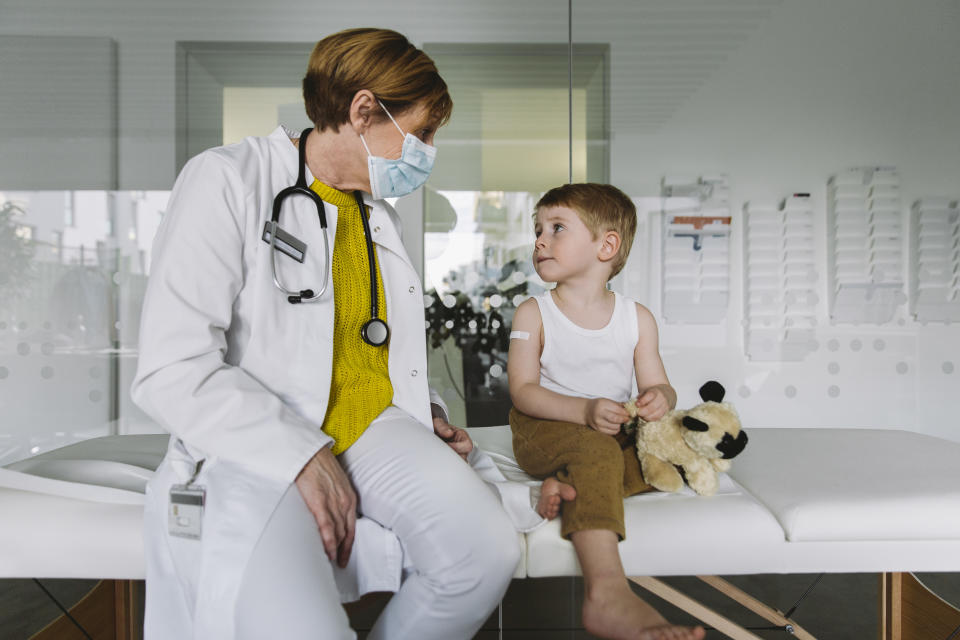How to boost your child's immune system during the pandemic, according to a doctor

Between the coronavirus pandemic, the reopening of some U.S. schools and the approach of flu season, parents are facing a perfect storm of health anxieties concerning their kids. And with new research suggesting that children could be a “potential source of contagion” for COVID-19 — though experts caution that more data is needed to determine if they are capable of spreading the virus the same way they do influenza — there’s more urgency to keep youngsters healthy and their immune systems strong enough to fight off classroom and daycare germs.
Dr. Shanna Kowalsky, a pediatric associate hospital epidemiologist and assistant clinical professor of Pediatrics and Infectious Disease at the Icahn School of Medicine at Mount Sinai in New York City, predicts that the colder fall and winter months ahead will also be a factor in increasing the risk of COVID-19 transmission, as activities move indoors. Even as the U.S. death count climbs past 170,000 people, Kowalsky tells Yahoo Life that the country could have seen “even worse outcomes” had the pandemic not struck during a time when the weather was milder and mitigating risk by limiting socialization to the outdoors remained a possibility.
“I think that as the school year starts and we’re going to start moving into flu season and then winter, where we really can’t be outdoors as much, it’s going to force people indoors,” she says. “I think that the risk in general to people is going to be higher ...
“It’s more important now than ever to make sure we keep up with our general health care maintenance,” she adds.
What does that entail, exactly? And what are the most effective things parents can do to help boost their kids’ immune systems?
For starters, add some fruits and veggies to your curbside grocery order. Kowalsky advises eating a “healthy, well-balanced” diet featuring items like berries and leafy greens.

Kids should also get plenty of rest and regular physical activity and exercise.
And parents shouldn’t postpone those routine wellness checks, even if they’re wary of visiting a doctor’s office mid-pandemic. While Kowalsky does advise avoiding anyone who might be ill, it’s important to not let check-ups fall by the wayside; medical professionals have also been following new protocols to significantly minimize contact with other patients.
“I know there’s been lapses with that in the era of COVID and people being reluctant to go to their doctor’s for their regular annual check-ups, but [people should try] to stay up-to-date with their annual visits, as well as their health care maintenance of staying up-to-date with all of their vaccines, especially now that we’re on the heels of flu season,” says Kowalsky. “In the next month or so, it’s going to be time to start getting the flu shots.”
The pandemic also calls for adopting risk-mitigating habits, including frequent hand-washing, maintaining six feet of social distance if possible, wearing masks when age-appropriate [the Centers for Disease Control and Prevention recommend coverings from the age of 2] and teaching little ones to avoid touching their face or putting their fingers in their mouth.
Breastfeeding may also offer some benefits, says Dr. Nina Shapiro, professor of head and neck surgery at UCLA and author of Hype: A Doctor's Guide to Medical Myths, Exaggerated Claims and Bad Advice: How to Tell What's Real and What's Not. Early on, nursing mothers can “transfer some immunity” to infants who haven’t yet had their own vaccinations; over time, their immune systems become stronger and less dependent.
“If a child is up-to-date with their immunizations, their immune system is developing more so than when they were 3 months old,” she says. “There will be some [benefits], because their immune system is still a bit immature compared to say, a 4- or 6-year-old, but it’s certainly much more robust than a newborn. But the only reason to stop nursing is because you want to stop nursing.”
And what of the multivitamins and elderberry supplements often touted on parenting message boards?
"There is no way to boost one's immune system with any supplement of any kind,” Shapiro tells Yahoo Life. “Hard stop.”
While she acknowledges that supplements, so long as they don’t involve a megadose, are generally benign and may have some sort of placebo effect, they’re not necessary outside of the rare case of child vitamin deficiency. Otherwise, “there’s no evidence that any supplement is going to boost your immune system per se; it’s not really going to have a direct effect.”
What will?
“The ways to keep your child healthy this season is to get them a flu shot as soon as it comes out, and to [have them] wear a mask when they’re in public,” Shapiro says. “It’s really simple. That will prevent colds, and spread of flu, and the spread of COVID-19.”
For the latest coronavirus news and updates, follow along at https://news.yahoo.com/coronavirus. According to experts, people over 60 and those who are immunocompromised continue to be the most at risk. If you have questions, please reference the CDC’s and WHO’s resource guides.
How to maintain your physical and mental health during the pandemic
Taking care of a loved one with COVID-19? Here’s how to stay healthy
Q&A with Dr. Kavita Patel: How to keep your family safe and maintain your mental health
Read more from Yahoo Life
Want daily lifestyle and wellness news delivered to your inbox? Sign up here for Yahoo Life’s newsletter.



